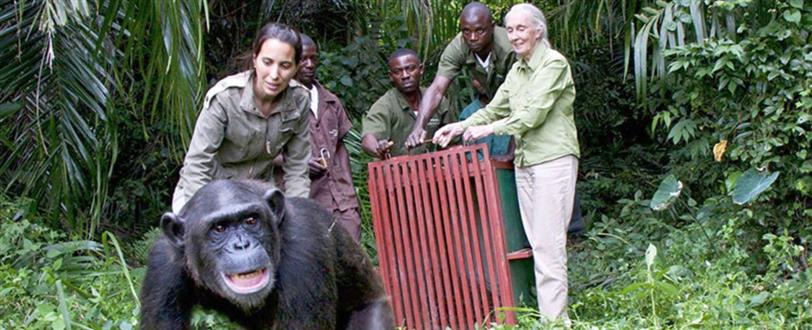
Returning chimps to the wild isn’t as easy as you think!

By Gregory Rodriguez
“Why can’t the chimps be sent back to Africa?” is a common question we get at Project Chimps. So, let’s explain why that is a complicated and sometimes fatal move.
Sanctuary vs Rehabilitation
Here at Project Chimps, we provide lifelong permanent housing for chimps and that is different than a rehabilitation program. Rehabilitation centers often are working towards the chimps returning to the wild.
A lot of the behavior training we do is to help chimps work better together while they live at the sanctuary. Meanwhile, in other sanctuaries such as the Chimpanzee Rehabilitation Project, chimps are both allowed to live out their days and be trained for reintroduction to the wild.

island of Tchindzoulou. © Jane Goodall Institute / By Michael Cox”
Why don’t our chimps return to the wild?
The chimps residing with us are “third-generation Americans”, they have never set foot in Africa or seen their wild cousins. They would not be familiar with the weather and geography of their native land nor have the same communication style as those in the wild. Chimpanzees can also develop PTSD because of this past treatment in captivity. These factors can make it hard for the chimps to develop the skills necessary for survival if they were to be released from direct human care.
Imagine what a chimp would do in the wild after a life of relying on humans for their food and shelter. Without older chimps to show them where to forage and how to navigate the seasonal changes, some may end up gravitating towards farms where they can find food easily. This increases human-chimp conflict that can result in chimps being poached or killed outright.

Problems with returning chimps to the wild
Releasing chimps from captivity into the wild has unintended environmental consequences. Some chimps can carry diseases and if reintroduced to a new population, that can spread to other chimps in the wild.
According to Save The Chimps, ” Chimpanzees in the US were bred indiscriminately, not based on subspecies. If these chimps were released into the wild it could disrupt the genetics of current populations.”
Should we be returning chimps to the wild?
Chimpanzees raised in captivity have an opportunity to live out their lives as naturally as we can make it. It may never compare to the life they could have had in the wild, but if they were not born there, it is not right to try and force them to return there. Sanctuary life means ‘community’ for chimps who would otherwise have no place to go.
You can help support a captive chimpanzee stay comfortable and safe by donating today.

